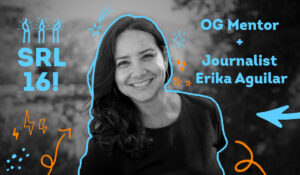SRL 16: Words of advice from early SRL mentor Erika Aguilar

Happy 16 years of Student Reporting Labs!
PBS News Student Reporting Labs was founded by Leah Clapman in 2009 as an experiment of the PBS News Hour: What could national news stories look like if reported in partnership with local high school broadcast and journalism classes? What started with six pilot schools reporting video stories in their communities has grown to service hundreds of schools and thousands of educators and students across the country.
In celebration of our “Sweet Sixteen,” we recently spoke with five of the original pilot educators and journalists who helped prove the concept and build the foundation of this vibrant community of storytellers.
Erika Aguilar was an early-career reporter at KUT Austin when she first got involved with Student Reporting Labs in 2009. A one-time invite to talk to some high school students became a weekly lecture, which grew into a full semester-long class to teach students the principles and practices of journalism. For two years, Erika taught one of the first SRL pilot classrooms in Austin, before moving to Los Angeles and later becoming an Executive Producer for NPR’s Morning Edition. Read on to discover what she’s learned from students, plus advice for educators and young journalists alike.
This Q&A has been lightly edited for clarity.
Why is it important for students to get hands-on experience with journalism?
Because the industry is changing so much. It’s so important for students to get that hands-on experience because technology moves so fast and people move so fast. The amount of attention that people have right now is like a mosquito’s length compared to a dragonfly before. It’s just the way it is. It’s really important for students to be connected with people who practice this stuff in the real world because those concepts of change and adaptation are going to continue no matter how many decades later.
How has working with young people impacted you/your work as a reporter?
Young people teach you so many awesome things in life. They keep you energized. They keep me cool – or attempting to be cool. They help me learn. Like I said, if you want to continue and be relevant and be successful in this industry, you have to keep up with technology.
You have to keep up with how people are consuming content, and what they like. It’s the same as if you were a novelist and you’re writing a book. Let’s say you’re a young adult novelist. You have to be reading what YA readers are reading, right?
Young people help me remember that as a journalist, my job is to create for people, for them. If they find it useful, I’ve done my job.
What role do you think public media plays in our society?
Public media is free, and it should be. You don’t have to pay a monthly subscription fee. And most importantly, when journalists are doing our jobs correctly and honestly, we are offering and producing news that is reliable and fact checked so that you don’t have to.
Right now, people have to do the work of asking, is this fake? Is this real? Did they splice this? Who made it? How do they know this, right? There’s a lot of work that you have to do theoretically when it comes to media.
The commitment that public media stations have to people is that we will do that work for you, and we promise that it will be done honestly, with integrity. It will be done as best as we can and if we mess up we’re going to tell you, because that’s how you maintain trust. Trust is the biggest currency for any news organization, whether that’s public media or not.
That’s the role that I think public media plays in our society and in our democracy. The more people are informed about what’s going on in the world, the more in sync they are, the more aligned we are and the more democracy can continue.
Any advice for students trying to learn storytelling on their own?
Do some listening. Take a weekend and just browse around different podcasts. The ones that you like, listen again and take notes. Every time that you like something, write down the thing that you liked and the time code. Then when you go back, ask yourself: why did I like that? Was it the joke itself? Was it the pace that it moved? What you’re doing is dissecting and teaching yourself how to create your own style.
I still tell people when I’m hiring, there are two things that I cannot hire for: motivation or dedication, why you get up every day. I can’t give that to you. And style. I can’t teach you style. You’re developing your style by listening to others and saying, “oh, that was stupid.” “Oh, I liked that.” “Ooh, that would be better if you did this.” And before you know it, you find your own style.
That’s the thing that publishers, legacy news organizations, newsroom bosses like myself, are looking for: someone who has developed a style.
Do you have any advice for teachers or anyone trying to teach media skills?
This applies to everybody, especially journalists. Ask your students what they want and what they need. They’ll tell you. If you can, use your position of power to help them. Ask them what they want and need.
The other thing is that young people know a lot and they can learn really fast. They learn so fast. As I’ve gotten older, I’ve feared sometimes that I might be giving someone too much to do, or it’s too hard, or a lot of responsibility, and I’ll scale it back. I do that with my family too, and they’ll ask “why?” But I don’t have to. Young people especially, they learn so fast and they’re so resilient.
Those challenges that seem just a little over their head are what helps them learn faster, and more importantly helps them learn more about who they are and what they’re able to do. Don’t fear that they may not be able to meet the challenge or the expectation. They absolutely can.






